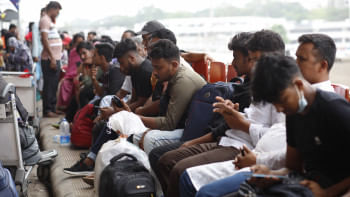What more can the state do for our diaspora?

Bangladeshis working in various countries around the world are playing a significant role in the nation's overall economic growth by sending their hard-earned remittances. According to data from Bangladesh Bank, remittances contribute approximately 6 to 7 percent to Bangladesh's national economy.
As of July 2023, the number of Bangladeshi diasporas was approximately 15.513 million. The countries with the largest Bangladeshi diaspora populations include Saudi Arabia, the UAE, Kuwait, Oman, Malaysia, the UK, the US, and Canada—home to about 36.45 percent of the total diaspora. An estimated 5 to 7 million Bangladeshis reside in the Middle East alone, with more than 2.5 million living in Saudi Arabia. In terms of the foreign labour market in Saudi Arabia, Bangladesh ranks just behind India and Pakistan.
It goes without saying that members of the diaspora face various challenges, including limited employment opportunities, complications related to passports and visas, and a lack of social recognition. The state must pay greater attention to the struggles and hardships experienced by the diaspora community.
A report by the digital migration platform Ami Probashi mentioned that manpower export in 2024 decreased by 27.4 percent compared to 2023, which has become a cause of great concern for Bangladesh. The Refugee and Migratory Movements Research Unit (RMMRU) mentioned in their report that around 1.12 million Bangladeshi workers went abroad in 2024. Among them, the number of skilled workers was 214,044, which is 23.62 percent of the total labour market. At the same time, 491,480 people, or 54.23 percent, went abroad as low-skilled workers.
Despite the obstacles, Bangladeshis living abroad sent $27 billion in 2024. As a result, Bangladesh ranked seventh globally among remittance-earning countries—its highest position in history. India was the top remittance recipient in the world, receiving an estimated $129.1 billion in 2024. In the same year, Bangladesh ranked fifth among remittance-earning countries in Asia—Pakistan ranked fourth with $33 billion, the Philippines third with $40 billion, and China second with $48 billion.
In 2025, it is likely that all previous records for remittance inflows to Bangladesh will be surpassed. A new record was set in March during Eid-ul-Fitr, when remittances totalled $3.29 billion. In February, total diaspora income rose to $2.53 billion, also marking the highest ever for a single month. Statistics show that the total amount of remittances sent by the diaspora over the last 10 years amounted to $177.59 billion.
Although remittance flows faced some challenges during the 2023-24 fiscal year, there has been promising progress in recent times. However, many of the demands made by the diaspora remain unaddressed. Among them, several urgent issues require immediate attention from the state.
To increase remittance flows, the dominance of hundi systems must be eradicated. Sending money through hundi instead of official banking channels undermines legitimate remittance flows. To combat this, awareness must be raised, and banking services should be made more accessible, efficient, user-friendly, and appealing.
The government must take more effective steps to export skilled manpower. Due to a lack of adequate skills, many members of the diaspora are employed in low-paying jobs. Although there are Technical Training Centres (TTCs) across the country, the desired progress has yet to be achieved.
Employment issues faced by members of the diaspora must be addressed swiftly. In cases involving labour abuse or other employment-related problems, prompt action should be taken through embassies or diplomatic channels.
Bangladesh should reduce its dependence on remittances in the national budget. The country must boost its overall exports and local production to ensure long-term economic stability.
A special insurance policy for the diaspora could be introduced. The current 2.5 percent incentive for sending remittances via banking channels could be increased, with a portion allocated towards life and health insurance for diaspora families. Banks offering insurance products for the diaspora may provide valuable guidance in this regard.
The security of diaspora families and their assets must be strengthened. Many members of the diaspora are concerned about the safety of their families and properties. In some cases, hard-earned assets are unlawfully seized. Appropriate and strict legal action must be taken to prevent this.
Partial tuition fee waivers and other benefits could be offered for the education of diaspora children. Educational institutions might also offer special provisions for children of those who send remittances through banking channels.
Passport issuance and renewal should be made more convenient for the diaspora. Primary personal data and photographs could be authenticated digitally during the renewal process, or when issuing national identity cards, birth certificates, and other documents.
Airports must be upgraded to provide a more comfortable experience for the diaspora upon arrival and departure. Many complain of mistreatment at airports, including loss of valuables and unnecessary harassment. The government has responded to some concerns by inaugurating a VIP lounge at the airport, a move that has been widely appreciated. However, it remains vital to treat diaspora members as VIPs, recognising them as a key driving force in the nation's economy.
Remittance inflows should not be restricted to a few Middle Eastern countries. There is significant potential for exporting manpower to regions such as Europe, Japan, South Korea, and Australia. Accessing these labour markets could further boost remittance inflows.
Lastly, loans and other banking facilities on favourable terms should be provided to encourage investment by the diaspora. To achieve this, more effective and thoughtful measures must be undertaken, keeping the well-being of the diaspora at the forefront.
M M Mahbub Hasan is head of financial inclusion and school banking at Prime Bank PLC. He can be reached at [email protected].
Views expressed in this article are the author's own.
Follow The Daily Star Opinion on Facebook for the latest opinions, commentaries and analyses by experts and professionals. To contribute your article or letter to The Daily Star Opinion, see our guidelines for submission.


 For all latest news, follow The Daily Star's Google News channel.
For all latest news, follow The Daily Star's Google News channel. 






Comments